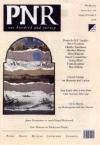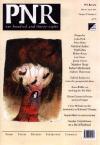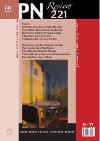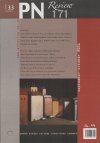
Most Read...
The Cult of the Noble Amateur
(PN Review 239) Bill Manhire in Conversation with John McAuliffe
(PN Review 259) Val Warner: A Reminiscence
(PN Review 259) A Lyric Voice at Bay
(PN Review 121) On Judging Prizes, & Reading More than Six Really Good Books
(PN Review 237) Notes on a Viking Prow
(PN Review 10)
(PN Review 239) Bill Manhire in Conversation with John McAuliffe
(PN Review 259) Val Warner: A Reminiscence
(PN Review 259) A Lyric Voice at Bay
(PN Review 121) On Judging Prizes, & Reading More than Six Really Good Books
(PN Review 237) Notes on a Viking Prow
(PN Review 10)
From the Archive
Next Issue
Stav Poleg's Banquet
Stanley Moss In a concluding conversation, with Neilson MacKay
John Koethe Poems
Gwyneth Lewis shares excerpts from 'Nightshade Mother: a disentangling'
John Redmond revisits 'Henneker's Ditch'
News
Sarah Kirsch (16th April 1935 – 5th May 2013): a tribute by Anne Stokes
Tuesday, 28 May 2013
On May 22nd, the German poet Sarah Kirsch’s publishing house, the Deutsche Verlags-Anstalt in Munich, announced that the author had died on May 5th following a short bout of serious illness. She was 78 years old, and died in her adopted homeland, Schleswig-Holstein, to which she retreated in 1983, and which formed the subject of or backdrop to much of her later work.
Kirsch’s life and writing career began, however, in the former East Germany. Born Ingrid Hella Irmelinde Bernstein in 1935 in Limlingerode in Southern Saxony, an area which became part of the German Democratic Republic in 1949, she took the name Kirsch when she married East German poet Rainer Kirsch in 1960, and, in the same year, she adopted the name Sarah in commemoration of Jewish victims of the Holocaust, thereby distancing herself from Fascism, and, more generally, highlighting the fact that anti-Semitism was a feature not only of West but also East Germany’s past. A free spirit, often at the centre of controversy because of the criticism of state policy implicit in much of her writing, Kirsch felt compelled to leave East Germany in 1977 due to persecution experienced after she signed a petition against the expulsion of the non-conformist singer-songwriter Wolf Biermann in November of the previous year.
Shortly after arriving in the West, Kirsch wrote of the remnants of her socialist dream in a poem titled ‘Kite-flying’: “Ours was what’s left of the string / and having known you.” After the passing of Kirsch herself, we are fortunate to still have her writing. Between 1967 and 2012, she produced ten volumes of poetry for which she received numerous prizes, including the Petrarch Prize (1976), the (West) German Critics’ Prize (1981), and the prestigious Georg Büchner Prize (1996) awarded by the German Academy for Language and Literature. Although known mainly for her poetry, she also wrote prose, which she regarded as an extension of her poetic work, and she painted in watercolours, as a diversion from both.
Over the past three years, I have been submerged in Kirsch’s poetry, preparing an English selection from her ten volumes titled Ice Roses: Selected Poems. The volume, which will be published later this year by Carcanet, highlights the main themes of her work – the vicissitudes of love; life in Germany, East and West, past and present; and, most recently, humanity’s relationship with nature – and attempts to capture her unique style, from the emotionally charged, cascading lines of much of her poetry through to the sparse, meditative verse of her last two volumes. It will now be dedicated to the memory of Sarah Kirsch, and, along with the work of previous translators, it is my hope that it will bring her poetry to the larger English-speaking audience it deserves.
Kirsch’s life and writing career began, however, in the former East Germany. Born Ingrid Hella Irmelinde Bernstein in 1935 in Limlingerode in Southern Saxony, an area which became part of the German Democratic Republic in 1949, she took the name Kirsch when she married East German poet Rainer Kirsch in 1960, and, in the same year, she adopted the name Sarah in commemoration of Jewish victims of the Holocaust, thereby distancing herself from Fascism, and, more generally, highlighting the fact that anti-Semitism was a feature not only of West but also East Germany’s past. A free spirit, often at the centre of controversy because of the criticism of state policy implicit in much of her writing, Kirsch felt compelled to leave East Germany in 1977 due to persecution experienced after she signed a petition against the expulsion of the non-conformist singer-songwriter Wolf Biermann in November of the previous year.
Shortly after arriving in the West, Kirsch wrote of the remnants of her socialist dream in a poem titled ‘Kite-flying’: “Ours was what’s left of the string / and having known you.” After the passing of Kirsch herself, we are fortunate to still have her writing. Between 1967 and 2012, she produced ten volumes of poetry for which she received numerous prizes, including the Petrarch Prize (1976), the (West) German Critics’ Prize (1981), and the prestigious Georg Büchner Prize (1996) awarded by the German Academy for Language and Literature. Although known mainly for her poetry, she also wrote prose, which she regarded as an extension of her poetic work, and she painted in watercolours, as a diversion from both.
Over the past three years, I have been submerged in Kirsch’s poetry, preparing an English selection from her ten volumes titled Ice Roses: Selected Poems. The volume, which will be published later this year by Carcanet, highlights the main themes of her work – the vicissitudes of love; life in Germany, East and West, past and present; and, most recently, humanity’s relationship with nature – and attempts to capture her unique style, from the emotionally charged, cascading lines of much of her poetry through to the sparse, meditative verse of her last two volumes. It will now be dedicated to the memory of Sarah Kirsch, and, along with the work of previous translators, it is my hope that it will bring her poetry to the larger English-speaking audience it deserves.





